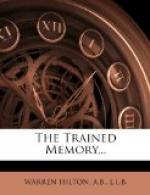Groups consist, therefore, not only of associated ideas, but of associated ideas coupled with their emotional qualities and impulses to muscular movements.
All groups bound together by a mutually related idea constitute a single “complex.” Every memory you have is an illustration of such “complexes.”
[Sidenote: The Thrill of Recollection]
Suppose, for example, you once gained success in a business deal. Your recollection of the other persons concerned in that transaction, of any one detail in the transaction itself, will be accompanied by the faster heartbeat, the quickened circulation of the blood, the feeling of triumph and elation that attended the original experience.
[Sidenote: "Complexes” and Functional Derangements]
Complexes formed out of harrowing earthquakes, robberies, murders or other dreadful spectacles, which were originally accompanied on the part of the onlooker by trembling, perspiration and palpitation of the heart, when lived over again in memory, are again accompanied by all these bodily activities. Your memory of a hairbreadth escape will bring to your cheek the pallor that marked it when the incident occurred.
The formation and existence of “complexes” explains the origin of many functional diseases of the body—that is to say, diseases involving no loss or destruction of tissue, but consisting simply in a failure on the part of some bodily organ to perform its allotted function naturally and effectively.
[Sidenote: Automatically Working Mental Mechanisms]
Thus, in hay fever or “rose cold” the tears, the inflammation of the membranes of the nose, the cough, the other trying symptoms, all are linked with the sight of a rose, or dust, or sunlight, or some other outside fact to which attention has been called as the cause of hay fever, into a complex, “an automatically working mechanism.” And the validity of this explanation of the regular recurrence of attacks of this disease is sufficiently demonstrated by the fact that a paper rose is likely to prove just as effective in producing all the symptoms of the disease as a rose out of Nature’s garden.
Another striking illustration of the working of this principle is afforded by two gentlemen of my acquaintance, brothers, each of whom since boyhood has had unfailing attacks of sneezing upon first arising in the morning. No sooner is one of these men awake and seated upon the edge of his bed for dressing than he begins to sneeze, and he continues to sneeze for fifteen or twenty minutes thereafter, although he has no “cold” and never sneezes at any other time.
[Sidenote: Two Classes of “Complexes"]
Obviously, if absolutely all mental experiences are preserved, they consist altogether of two broad classes of complexes: first, those that are momentarily active in consciousness, forming part of the present mental picture, and, second, all the others—that is to say, all past experiences that are not at the present moment before the mind’s eye.




